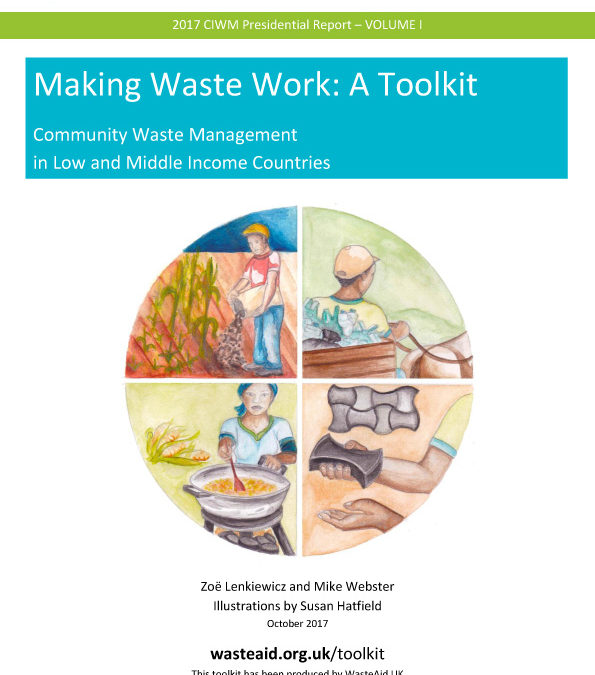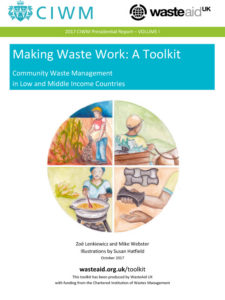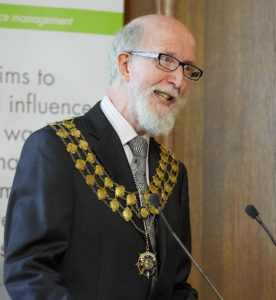
18 October, 2017 | Publication, Waste Management

DCW’s CIWM Presidential Report 2017 prepared by WasteAid UK

Professor David C Wilson giving his inauguration speech as CIWM President 2017-18
At his inauguration on 17th October 2017, Professor David C. Wilson launched his CIWM Presidential Report: Making Waste Work: A Toolkit – Community Waste Management in Low and Middle Income Countries. The aim is to help poor communities in the least developed countries, part of the 40% of the World’s population who lack access to any solid waste management services, to help themselves by developing self-sustaining businesses making useful products for the local market from the resource value in their waste. WasteAid UK have prepared this practical guidance on low cost recycling technologies, involving minimal capital investment, to help people become self-employed recycling entrepreneurs, providing a very valuable service for the health and well-being of their community, and the whole planet – as well as reducing poverty and creating sustainable livelihoods.
In his inauguration speech, DCW called on the international community to increase substantially, from the current 0/3% to 3.0%, the proportion of Official Development Assistance directed to solving the ‘global waste emergency’. But he also said that it was not enough to work with national and local governments to solve the problem from the ‘top down’. In parallel, it is necessary to work from the ‘bottom up’, helping communities in the poorest countries, where the local authority often has no funds to provide a service, to tackle the problem themselves through the resource value in the wastes. If, for example, food wastes or plastics are kept separate, they can be turned into new, useful products. One of the gaps identified by UNEP’s Global Waste Management Outlook ( GWMO – for which DCW was the lead author) was for practical guidance on low-cost ‘waste to wealth’ technologies which involve minimal capital investment and make products to sell in a local market.
Making Waste Work: A Toolkit has been developed by WasteAid UK to fill that gap, providing accessible and well-illustrated guidance designed for use by local practitioners. An early draft of the report was field tested at a pan-African workshop in The Gambia. Volume 1 covers part A, Be informed: Community waste management essentials, and part B, Be prepared: How do I make a waste project happen? Volume 2 covers part C, Be inspired: Step-by-step guides, which include measuring what is in your waste, five technologies for recovering value from organic wastes, four focusing on plastic wastes, plus waste collection and safe disposal of the residual wastes. There is also a short Executive Summary. The links above are to the three reports on the CIWM website; the dedicated WasteAid Toolkit homepage gives access to all the material, including the individual How-to guides, in separate user friendly formats designed for mobile devices and for laptops/ desktops.
4 April, 2017 | Conference, Waste Management
An international workshop on community resilience and waste management will be taking place in The Gambia 25-30 April 2017. Organised jointly by the Arkleton Trust and WasteAid UK, the event will involve communities from The Gambia, Senegal, Ethiopia, Kenya, Malawi, Uganda, Cameroon, Nigeria and India. WasteAid UK is currently undertaking David Wilson’s Presidential Project for the Chartered Institution of Wastes Management (CIWM), to compile practical guidance on how to provide community level waste management and how to develop waste and recycling livelihoods. The workshopwill allow this guidance to be tested and developed further, ensuring it fits closely with the needs of the target users.
The first part of the workshop will focus on community resilience, encouraging attendees to share their experiences and good practice in anticipating risk, limiting impact, and ways to survive, adapt and grow stronger. Nicola Swan of the Arkleton Trust, an expert in rural development and knowledge exchange, said: “The workshop will provide a creative space for grassroots community practitioners, leaders and policy makers to come together and share experiences and knowledge, and to learn from each other. The ingenuity of communities to succeed is profound and many communities have addressed issues in innovative ways. Lack of infrastructure and other systemic issues remain a challenge though, and for this reason, we will be inviting a few policy makers and academics to benefit from the opportunity to hear things ‘from the horse’s mouth.’”
https://samtech.edu/cheap-viagra/
The second part of the workshop will cover waste management as a key tool for resilient communities. Waste that is not managed can become a hazard for people and wildlife. With simple recycling skills, however, people can keep their communities clean, create jobs and earn an income. WasteAid UK and other recycling specialists will be sharing recycling skills such as making charcoal from woody waste, fertiliser from food waste, and construction materials from plastic waste. WasteAid UK previously set up the Brikama Waste Reprocessing Centre in 2016 in partnership with Women’s Initiative The Gambia and is currently developing a Guide to Community Waste Management, with funding from CIWM, which will be reviewed by workshop participants. Mike Webster of WasteAid UK said: “Improving waste management is vital for communities to prosper and stay healthy. The event will allow skill sharing between community waste managers located in geographically diverse parts of sub-Saharan Africa, and will help WasteAid UK improve the techniques that turn waste into an economic opportunity”.
22 November, 2016 | Awards, Publication, Waste Management
Professor David C Wilson was installed as Senior Vice President of the Chartered Institution of Wastes Management on 18 October 2016. CIWM has now commissioned WasteAid UK to undertake his Presidential project, which will prepare guidance on low-cost reuse and recycling technologies for use in low- and middle- income countries. This was one of the recommendations for follow-up work coming out of the 2015 UNEP Global Waste Management Outlook, for which DCW was the Editor-in-Chief.
Further information is available in a joint CIWM and Wasteaid UK press release issued today. Professor Wilson said: “More than two billion people worldwide do not have a waste collection service, which results in severe public health problems – through children playing amongst waste, blocked drains, infectious diseases and inhalation of smoke from open burning. Even when waste is collected, uncontrolled dumping is the norm – the waste of some 3 billion people isn’t disposed of safely.
“Many cities in Africa and Asia are growing so rapidly that in 15-20 years’ time they will be generating twice as much waste as they do today. Already struggling with the waste crisis, these cities desperately need targeted support from the international community. In the meantime, sustainable and self-financing community-led solutions can make immediate improvements, hence the focus of this research.”
WasteAid UK delivers training in community waste management in low- and middle-income countries. In its first year the charity has worked in the Gambia, Senegal, Ghana and Kenya, setting up community recycling facilities and positively impacting the lives of some 124,000 people.
Mike Webster of WasteAid UK said: “This guidance, funded by CIWM, will enable us to help thousands of communities around the world to improve the way they manage their waste. It will show people how to treat different materials to maximise their value and minimise risks to human health and the environment.” DCW is Patron of Wasteaid UK.
1 April, 2016 | Waste Management
UNEP’s inaugural Global Waste Management Outlook (GWMO), which DCW edited, estimates that around 2 billion people worldwide still lack access to regular waste collection; while a larger number, around 3 billion, lack access to controlled disposal services for municipal https://www.babyscanclinic.com/blog/buy-cialis-tadalafil-online-20-mg/ solid wastes. WasteAid UK is a relatively new development charity set up by professionals to mobilise the UK waste and resource industry both to campaign and to address directly the global waste crisis, bringing solid waste management services to poor communities in the least developed countries. The particular niche where Wasteaid UK has chosen to focus is supporting unserved communities in Africa to recycle their wastes into sellable products, thus developing livelihoods, alleviating poverty AND establishing a sustainable solid waste collection and management system. I am proud to be the Patron of WasteAid UK, and encourage you to give us your support. Please read my blog on Responding to the global waste management crisis.


